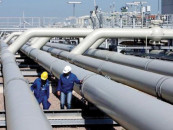Pakistan's economic revival
To complement these efforts, the government has prioritised fiscal discipline.

Pakistan's economy, long marred by cyclical crises and external dependencies, is on the cusp of a transformative journey. The government's bold reform agenda has ushered in a new era of fiscal discipline, investment attraction and economic diversification. As the Finance Minister represents Pakistan at the Davos Conference, the global economic forum provides an opportune platform to highlight the country's remarkable turnaround and invite international investors to partake in this evolving success story.
Confronted by severe economic challenges, including inflation peaking at 38% and GDP growth plummeting to 0.2% in 2023, Pakistan's government initiated a series of decisive reforms. The launch of the Uraan Pakistan initiative in 2024 marked a watershed moment in the country's economic trajectory. This ambitious economic transformation plan aims to achieve an export-led GDP growth rate of 6% by 2028, focusing on enhancing export competitiveness, optimising public finances and fostering public-private partnerships.
These efforts are paying dividends. Inflation has been reined in to 4.1%, while foreign exchange reserves now cover over two months of imports. The IT sector has emerged as a beacon of growth, expanding by 28% year-on-year, and goods exports have grown by 7.1%, signalling a resurgence of industrial and trade activity.
Key to Pakistan's economic revival is the government's focus on strategic sectors such as agriculture, IT, renewable energy, textiles and pharmaceuticals. These sectors not only offer substantial growth potential but also align with global sustainability trends. The agriculture sector is undergoing modernisation, integrating technology to improve productivity and exports. Similarly, the IT sector, buoyed by a young and skilled workforce, is rapidly becoming a cornerstone of Pakistan's export strategy.
To complement these efforts, the government has prioritised fiscal discipline. The reform-oriented budget for fiscal year 2024 aimed to raise Rs13 trillion in revenue - a 40% increase from the previous year. This was achieved by broadening the tax base, targeting under-taxed sectors and leveraging technology to enhance compliance and transparency. The modernisation of the FBR has played a pivotal role in improving tax administration and revenue collection.
Investor confidence in Pakistan has reached a two-year high, with significant FDI inflows and heightened interest from global corporations. The $7 billion Extended Fund Facility (EFF) from the IMF and a $20 billion collaboration with the World Bank targeting health, education, poverty alleviation and climate resilience have reinforced the country's reform agenda. These initiatives signal to global stakeholders that Pakistan is serious about embedding sustainability and resilience into its development model.
The success of these measures is evident in the record-breaking remittances of $35 billion and inflows of $9 billion through the Roshan Digital Account, reflecting growing trust among overseas Pakistanis. Additionally, the Pakistan Stock Exchange has delivered an 87% return in dollar terms, a testament to the renewed optimism surrounding the country's economic prospects. Notably, Pakistan's sovereign credit rating has been upgraded, with Moody's revising its economic outlook to 'Positive' in September 2024.
Despite these achievements, challenges persist. Structural inefficiencies in revenue collection, energy distribution and state-owned enterprises (SOEs) remain significant hurdles. These inefficiencies not only burden the economy but also hinder the government's efforts to achieve fiscal discipline. Addressing these issues is imperative for sustaining economic growth and reducing dependency on external financial assistance.
The energy sector, in particular, demands urgent reforms. High distribution losses, reliance on expensive imported fuels and inefficiencies in state-owned utilities continue to drain public resources. Similarly, the underperformance of SOEs highlights the need for governance reforms and privatisation to enhance efficiency and reduce fiscal pressures.
As Pakistan's leadership engages with global stakeholders at the Davos Conference, the country's strategic geographic location, abundant natural resources and progressive reforms offer a compelling investment proposition. The Special Economic Zones under CPEC provide an ideal platform for foreign investors to tap into Pakistan's potential in renewable energy, mining and pharmaceuticals.
Moreover, Pakistan's commitment to sustainability aligns with global priorities. The government's collaboration with the World Bank on climate resilience initiatives underscores its dedication to integrating sustainability into development efforts. These measures not only address pressing environmental challenges but also enhance the country's appeal to environmentally conscious investors.
To sustain and accelerate Pakistan's economic momentum, the government must prioritise deepening fiscal reforms by broadening the tax base, simplifying tax structures and enhancing compliance through digitalisation to improve revenue collection and reduce fiscal deficits. Strengthening governance in the energy sector by introducing competitive market structures, minimising distribution losses and incentivising investments in renewable energy is crucial to addressing inefficiencies.
The privatisation of underperforming SOEs through transparent and well-structured initiatives can enhance efficiency and alleviate the fiscal burden caused by these loss-making entities. Improving export competitiveness through targeted incentives for export-oriented industries, better trade logistics and negotiation of favourable trade agreements will be vital to boosting exports.
Additionally, investing in education and vocational training can empower the workforce with the skills required for emerging industries such as IT and renewable energy. Finally, fostering collaboration between public and private sectors is essential to mobilising resources and expertise for large-scale infrastructure and development projects that can sustain long-term economic growth.
As the Finance Minister presents Pakistan's success story at the Davos Conference, it is an invitation to global investors to become partners in this transformative journey. With strategic reforms, innovative policies and international collaboration, Pakistan is poised to emerge as a key player in regional economic stability and contribute meaningfully to global growth.





1729685382-0/Untitled-design-(57)1729685382-0-208x130.webp)










COMMENTS
Comments are moderated and generally will be posted if they are on-topic and not abusive.
For more information, please see our Comments FAQ